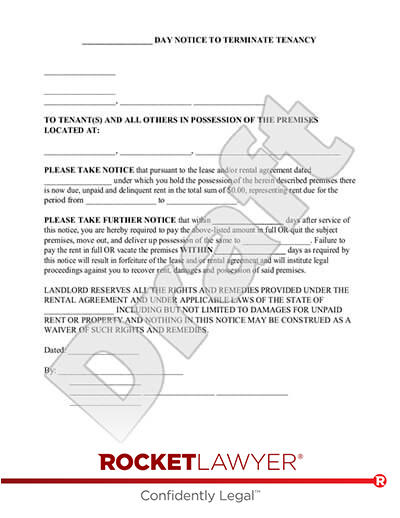Find out if eviction is even possible
Eviction moratoriums and state and local laws and programs may prevent landlords from evicting tenants based on nonpayment of rent. The CDC eviction moratorium has been extended several times. State and local governments have also implemented moratoriums that could last longer than the end of the federal moratorium. Check the Rocket Lawyer 2021 Eviction Moratorium Extension and Tenant Rent Relief Update for the latest news.
In addition, some states have strict eviction laws. A single late payment or even a series of late payments may not be sufficient grounds to evict. If your state does not allow an eviction for the first missed payment, you may need to wait even if you do not expect them to make future payments. You can use the Eviction Process Worksheet to see what you need before proceeding with an eviction.
View the eviction from the tenant's perspective
How would you want to be treated if you were in a similar situation? While some tenants have abused the eviction moratoriums to avoid rent they were able to pay, others have genuinely suffered misfortune. Most tenants that are delinquent on rent understand that they owe the money and need to pay. At the same time, they may be worried about possibly becoming homeless or not being able to eat. Understanding the situation from the tenant's perspective may help you communicate with the tenant more effectively, which could lead to solutions that benefit you both.
Ask if there is anything you can do
You may be able to help your tenant by facilitating a move rather than going through a formal eviction. Is there a more affordable unit on your property or do you know someone you can refer them to? Meanwhile, the tenant may be worried about having a bad reference or not being able to rent with a prior eviction. You can offer to talk to their next landlord on their behalf.
In some situations, you may waive part of the rent owed or your right to collect for the remainder of the lease if the tenant agrees to move out. In addition to taking financial pressure off of your tenant, this may give them an incentive to move out before a formal eviction.
Connect your tenant with support services
Rental assistance programs in your area could help your tenant directly with rent. Tenants may not be aware that financial assistance may be available to help them pay rent, or pay for other necessities that could free up money for rent.
Depending on your relationship with the tenant, you may also suggest counseling, whether it's personal, financial, or job support.
Provide additional time or short-term storage at reduced cost
It may take time for your tenant to find a new home. If they stay with a friend or relative, they may not have a place to store their belongings. You may give them extra time to move out or provide storage space at low-cost, or no-cost for a limited time, to make it easier for your tenant to relocate. Again, this helps by providing you an alternative to a formal eviction and the associated legal costs.
Waive cleaning fees and security deposit deductions
A final form of assistance you can provide is to waive cleaning fees and to return the tenant's full security deposit upon a satisfactory walkthrough. Beyond providing help to your tenant, tenants facing eviction often give up on cleaning and maintenance or intentionally damage the property. Conditionally waiving these can help you ensure that your property will be in a marketable condition as soon as your tenant moves out. Knowing the full deposit will be returned immediately after a satisfactory walkthrough can help tenants afford new accommodations sooner.
To learn more about your eviction rights or how to work out an agreement with your tenant, ask a lawyer.
This article contains general legal information and does not contain legal advice. Rocket Lawyer is not a law firm or a substitute for an attorney or law firm. The law is complex and changes often. For legal advice, please ask a lawyer.
